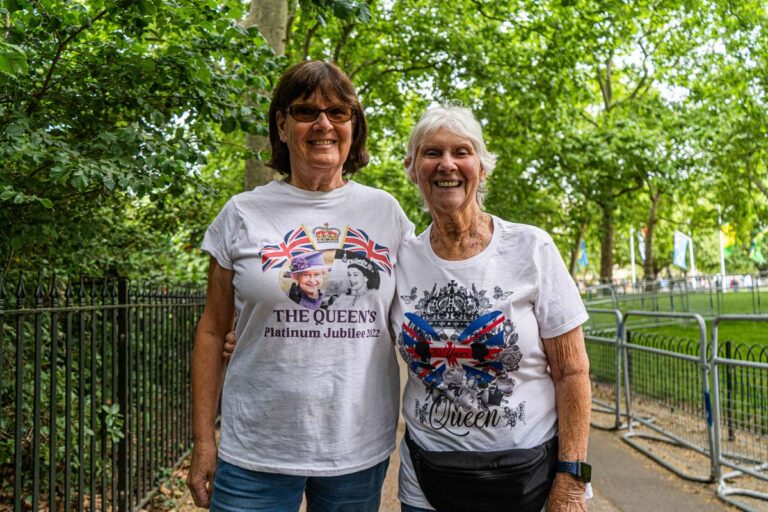‘It’s my lifeline’: the Queen’s mobility aids are something to celebrate, not mock
If you asked most people under 30 how they would react to the UK’s monarchy (at least in its current standing) being dismantled in their lifetimes, chances are, they’d be pretty happy about it. Until then however, whether you like it or not, it’s impossible to escape the Royal family’s comings and goings if you keep up with the news on any major platform.
Last week, the Queen was spotted at the Chelsea Flower Show using a mobility buggy to travel around the extensive gardens. In April 2022, she was rumoured to have used a wheelchair in public and before that—god forbid—a walking stick. All events were extensively reported on, with photos attached to back the claims—across tabloids and evening news shows. It seems mobility aids are high on the news agenda.
There is much to unpack about the obsession the general public have over celebrities’ health (royal or not) but the overwhelming response to the Queen using these aids has been pity, followed by distaste.
A mobility aid is associated with the elderly, the frail, and the unable to manage. For that reason, it appears baffling that the country at large takes such issue with the fact that a woman who is nearing one hundred years old needs to use one. But imagine people’s shock when they find out there are swathes of young people having to use such things too.
Ellie Darby-Prangnell spoke to SCREENSHOT about her experiences as a wheelchair user. Now aged 21, Darby-Prangnell has used a wheelchair since before she can remember. “I got my first chair when I was two years old after being diagnosed with Spinal Muscular atrophy type 2. I wouldn’t have been able to be anywhere except my bed without it. It’s my lifeline,” the fashion communication student explained.
Mobility aids function on multiple levels—they are tools for their user, as Darby-Prangnell described, but they are also symbolic, representative of illness. Although disabled people, myself included, view them as positive (once we have overcome our internalised ableism), a passerby can assume negative things from the sight of a chair or stick. Darby-Prangnell further explained: “Growing up I’ve had such a love/hate relationship with [my chair]. It’s what makes my condition visible to the world and therefore has invited ableist comments and attitudes towards me throughout my life.”
We have learnt by now that it is bad manners to comment on a person’s weight or appearance in general, but that lesson seems to have not stretched to mobility aids. “You need a licence for that thing!” says the guy who thinks he’s funny on the high street. “Bit young for one of those, aren’t you?” gets tiring pretty fast if you hear it every single time you leave your house.
Fiona is an 18-year-old who lives with complex chronic illnesses that cause symptoms such as dizziness, vertigo and instability. She recently started using a cane to support herself outside but is already sick of the looks she gets from others. She told SCREENSHOT, “It’s rare that I receive rude comments but the amount of stares feels analogous to an insult. I feel almost immediately self-conscious using it around strangers because of it.”
Acquiring an aid requires many disabled people to organise GoFundMes or drain their personal savings accounts because personalised and well-fitted wheelchairs are costly and can be hard to acquire through the National Health Service (NHS) for a lot of illnesses, particularly those that are viewed as ‘invisible’. The next stage of difficulty comes in navigating local towns and cities with your supposedly new-found freedom. Although many businesses advertise themselves as ‘fully accessible’, for those of us in chairs that tends to be a red flag rather than a reassurance of their inclusivity. Disabled people are not a monolith, their needs vary widely, including the types and functions of mobility aids.
If a gig venue, for example, assures website visitors that it will be fully accessible, but Google Maps shows steep steps to its entrance, it’s likely those of us in chairs will be entering through the backdoor, maybe the staff entrance and sometimes the service lift. You’ll have to sit on hold at the box office because you can’t get a confirmed wheelchair ticket online. No big deal, right? Well, you might be told you have to queue in a separate place from the rest of your large group of friends, that you can’t hang out in the lobby to wait for the support act, and every time you want to go to the bar, you’ll need a friend to shout your order for you. All of a sudden, your entire night is a reminder of how different your disabled body is, and what constant mental energy it takes to navigate things that are meant to be fun and carefree.
Even outside of venues and cities, there is no such thing as a spontaneous day out. Freja, who lives in the Scottish Highlands, told SCREENSHOT: “Getting my wheelchair and my smart drive power assist have allowed me to actually get outside again and do my favourite thing—walking the dog. The challenge has been finding walks that are wheelchair accessible as very few have been advertised as this. I have had to make my own map of possible accessible walks in the Highlands and am slowly working my way through them taking photos and giving descriptions so it can be a useful resource for others.”
All this to say that although there is a lifetime between the Queen and the countless young disabled people using wheelchairs and other aids, the public response remains the same—most strangers view us as unsightly, our wheelchairs remain a symbol of sickness for the average non-disabled person, and it seems like it’s simply too much for them to handle.





